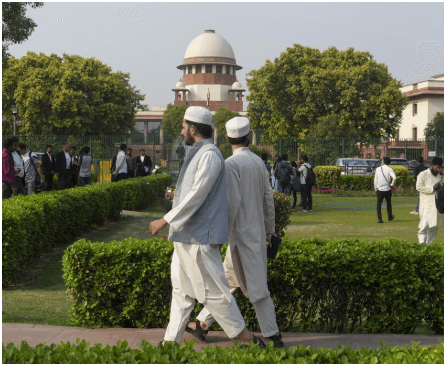Waqf (Amendment) Act, 2025 has quickly become one of the most contentious pieces of legislation in recent memory, igniting widespread protests across India and drawing criticism from various civil society groups, particularly among Muslim communities.
The amended Act, which revises key provisions of the original Waqf Act that governs religious endowments and properties managed for charitable and religious purposes in Islam, has been accused by its opponents of targeting the autonomy and rights of minority religious institutions. The scale of the backlash has escalated over the past weeks, with demonstrations taking place in major cities such as Delhi, Hyderabad, Lucknow, and Kolkata, and several legal petitions now pending before the Supreme Court.
Critics argue that the amendments represent a fundamental departure from the Act’s original intent and could open the door to state overreach in the management and control of waqf properties. Among the most controversial changes is the enhanced authority granted to state governments to review or even dissolve waqf boards without judicial oversight, and provisions that reportedly streamline the acquisition or repurposing of waqf lands for “public purposes” without requiring community consent. Legal experts and activists have described the amendments as vague and prone to misuse, raising alarms about the protection of minority rights under India’s secular constitutional framework.
For many in the Muslim community, the Waqf Act represents not just a legal framework but a cultural and religious institution that dates back centuries.
Waqf properties—mosques, graveyards, madrasas, orphanages, and charitable trusts—are considered sacrosanct assets meant to serve religious and social welfare objectives. The possibility that such properties could now be subjected to easier state intervention or appropriation has sparked a deep sense of insecurity and concern. Leaders from across religious, political, and academic spheres have condemned the amendments as discriminatory and demanded their repeal or reconsideration through public consultation.
In response to the rising tensions, several public interest litigations (PILs) were filed in the Supreme Court challenging the constitutional validity of the Waqf (Amendment) Act, 2025. Petitioners argue that the amendments violate Article 25 and Article 26 of the Indian Constitution, which guarantee freedom of religion and the right of religious denominations to manage their own affairs. The petitioners also claim that the law disproportionately affects the Muslim community and is, therefore, in violation of the principle of equality before law under Article 14. The Supreme Court, after initial hearings, has deferred its interim ruling until May 5, 2025, in order to allow further arguments and affidavits to be submitted by both sides.
Government representatives, for their part, have defended the amendments as necessary for improving transparency and accountability in the management of waqf assets, which they claim have been mired in corruption and mismanagement for years.
According to officials from the Ministry of Minority Affairs, the changes will help curb illegal encroachments and ensure that waqf resources are used efficiently for the intended beneficiaries. They argue that the new provisions offer greater administrative clarity and do not in any way interfere with the religious rights of individuals or communities. However, this defense has done little to quell the concerns of protestors or soften the stance of opposition parties, many of whom have accused the government of targeting minority institutions under the guise of reform.
Several prominent Muslim organizations, including the All India Muslim Personal Law Board and Jamiat Ulema-e-Hind, have issued strong statements against the amendments and vowed to continue peaceful protests until the law is repealed or substantially revised. They have also sought the intervention of international human rights organizations, arguing that the amendments could set a dangerous precedent for religious freedoms in a pluralistic democracy. Political parties across the ideological spectrum have taken varying stances, with some regional parties voicing support for the protestors and others choosing to remain silent or supportive of the government’s position.
Academics and legal scholars have highlighted that while reform in the waqf sector is long overdue, any legislative change must be balanced with stakeholder consultation and judicial safeguards. The unilateral nature of the amendment process—introduced and passed swiftly without parliamentary debate or public hearings—has only deepened suspicions about the government’s intent. Many point out that the waqf system, despite its flaws, plays an essential role in community welfare and religious life and should not be subjected to sweeping regulatory changes without broad consensus.
Meanwhile, on the ground, the protests have taken on a more organized and sustained form. Community leaders have coordinated marches, teach-ins, and interfaith solidarity events aimed at raising awareness and maintaining public pressure. In many cities, the demonstrations have remained peaceful, though there have been isolated instances of clashes with police and detentions of protest leaders. Civil society groups, including secular human rights organizations, have joined calls for greater transparency and accountability in how the government has handled both the legislation and the resulting public outcry.
Stay informed with the latest updates – click here .

